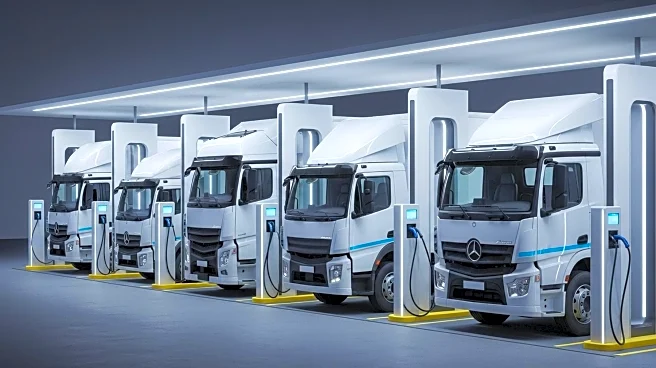What's Happening?
Mercedes-Benz Trucks is set to unveil an expanded portfolio of its second-generation battery-electric eActros on September 30. The new lineup will include various configurations such as tractor units, flatbed chassis with different wheelbases, models with two battery packs, and alternative L-cab versions. These new variants are based on the eActros 600, which boasts a high battery capacity and efficient electric drive axle, enabling a range of 500 kilometers without intermediate charging. The eActros 600 has been operational across 15 European countries and was awarded 'International Truck of the Year 2025'. The expansion aims to offer modular options to meet diverse transportation needs.
Why It's Important?
The introduction of new electric truck variants by Mercedes-Benz Trucks represents a significant advancement in sustainable transportation solutions. As the demand for eco-friendly vehicles grows, these new eActros models offer increased flexibility and efficiency for commercial transport. The expanded lineup supports the industry's shift towards reducing carbon emissions and reliance on fossil fuels. By providing a range of configurations, Mercedes-Benz Trucks is catering to various logistical requirements, potentially influencing market trends and encouraging other manufacturers to innovate in the electric vehicle sector.
What's Next?
Mercedes-Benz Trucks will officially present the new eActros variants on September 30, marking a key milestone in their electric vehicle strategy. The unveiling will likely attract attention from industry stakeholders, including logistics companies and environmental advocates. As these new models become available, they may lead to increased adoption of electric trucks in commercial fleets, driving further advancements in battery technology and infrastructure development. The success of these vehicles could also prompt regulatory changes to support electric transportation.
Beyond the Headlines
The expansion of the eActros family highlights the ongoing transition in the automotive industry towards sustainable practices. This shift not only addresses environmental concerns but also reflects changing consumer preferences and regulatory pressures. The development of efficient electric trucks may lead to broader implications for global supply chains, potentially reducing operational costs and enhancing energy security. As electric vehicles become more prevalent, they could also influence urban planning and infrastructure, necessitating adaptations to accommodate new transportation technologies.











